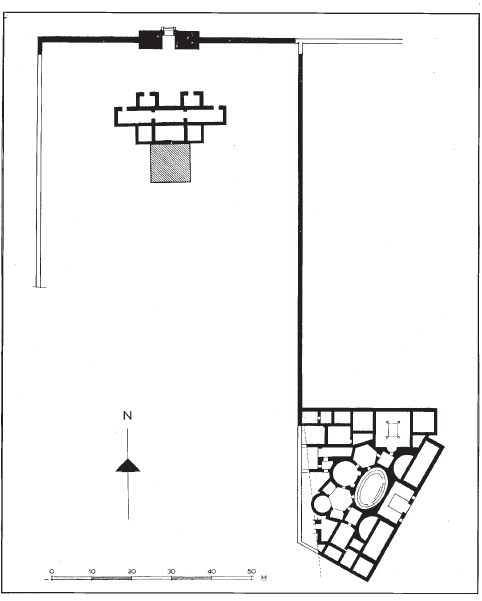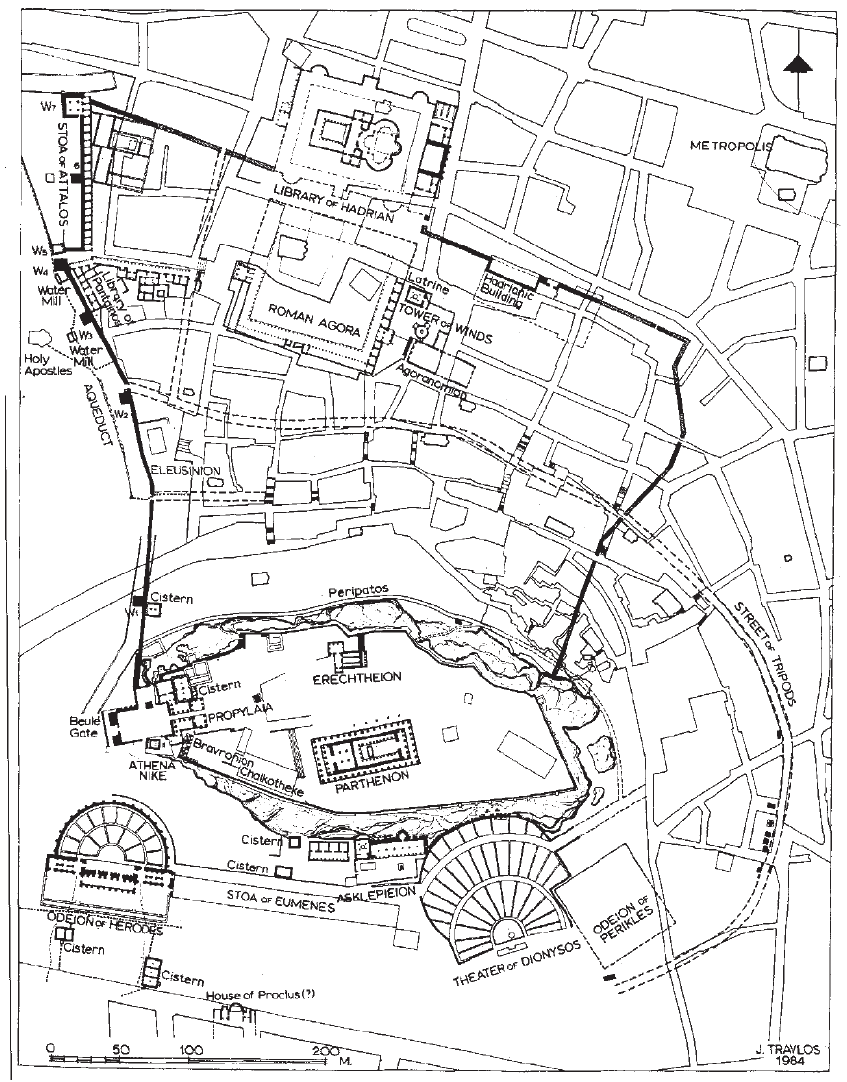Camp J. The Archaeology of Athens
Подождите немного. Документ загружается.


thinking that the lecture was being
canceled. So it became necessary for
Alexander to come forward to give
his discourse before Herodes ar-
rived. (Philostratus, Vit. Soph. 2.5.4)
With the collapse and subsequent reuse of
the Odeion of Agrippa for lectures, there
would have been a need for the new
Odeion of Herodes. The restoration of the
Odeion of Agrippa included an elaborate
new facade, which was decorated with
huge piers in the form of colossal figures
of giants (with snaky tails) and tritons
(with fishy tails). Their torsos and some of
the heads are copies of the figures of Po-
seidon and Hephaistos in the Parthenon
pediments; it appears that artists had ac-
cess to the pediments, allowing them to
make drawings or casts at this time. Note
also that the small-scale copies of Parthenon pedimental figures used in Temple F at Eleu-
sis date to this same period.
Herodes served as archon at Athens and as consul at Rome and clearly spent time in
and owned properties in several places. We have no fewer than two hundred inscriptions
pertaining to his career or family. Not all his duties were onerous: he served as the presi-
dent of the Iobacchoi, a religious association in honor of Bacchos, god of wine. Their club-
house has been excavated in the valley west of the Acropolis; it is a large rectangular hall
measuring about 10 by 20 meters, with two smaller rooms adjoining. In its ruins was also
found a column which carries a long inscription (IG II
2
1368) preserving the minutes of the
meeting at which Herodes was elected president. The rules of the club are recorded and
make it clear that the proper worship of Bacchos required the membership to consume
large quantities of wine with some frequency. The regulations governing behavior at club
gatherings are accordingly reminiscent of those applying to a college fraternity:
218 ROMAN ATHENS
212
213
212. Giant from the facade of the rebuilt Odeion
of Agrippa, mid-2nd century a.d.
[To view this image, refer to
the print version of this title.]

No Iobacchos who has not paid his contribu-
tions for the monthly and annual meetings
shall enter the gathering until the priests
have decided either that he must pay or that
he may be admitted. If anyone starts a fight
or is found acting disorderly or occupying the
seat of any other member or using insulting
or abusive language to anyone, the person so
abused or insulted shall produce two of the
Iobacchoi to state upon oath that they heard
him insulted or abused, and he who was
guilty of the insult or abuse shall pay to the
society 25 light drachmas.
One of Herodes’ private estates, in Kynouria, south
of Argos, has recently been excavated and has produced
a villa of extraordinary wealth in terms of mosaics, archi-
tecture, and sculptural adornment. In Attica, Herodes is
associated in particular with two demes: Kephisia and
Marathon. In Kephisia, parts of a villa have been found
together with inscriptions referring to Herodes, along
with a burial chamber with three marble sarcophagi
which seem to have been used by his friends or family.
These remains are only a small part of the luxurious es-
tate he maintained in the garden suburb of Kephisia; the Roman Aulus Gellius paints an
evocative picture of the rich lifestyle enjoyed there in the second century:
While we were students at Athens, Herodes Atticus, a man of consular rank and
true Greek eloquence, often invited me to his country houses near that city, in
company with the honorable Servilianus and several other of our countrymen
who had withdrawn from Rome to Greece in quest of culture. And there at that
time, while we were with him at the villa called Kephisia, both in the heat of
the summer and under the burning autumnal sun, we protected ourselves
Roman Athens 219
213. Rules of the Iobaccheion, presided over by Herodes Atticus,
ca. a.d. 170.
[To view this image, refer to
the print version of this title.]

against the trying temper-
ature by the shade of its
spacious groves, its long,
soft promenades, the cool
location of the house, its
elegant baths with their
abundance of sparkling
water, and the charm of
the villa as a whole, which
was everywhere melodi-
ous with splashing waters
and tuneful birds. (Attic
Nights 1.2.1–2)
Several monuments are
also associated with Herodes
in his home deme of Mara-
thon. Part of what seems to be his estate has been excavated on the seashore at the south
end of the plain. The remains include a large bathing establishment with a handsome
oval pool in the center. Nearby is a shrine of the Egyptian gods (Isis, Sarapis, and Anou-
bis), who were popular in Greece throughout the Hellenistic and Roman periods. The
foundations of a small podium temple survive, along with the enclosure wall and gate-
way. Two large Egyptian-style striding figures were found, together with a lintel block
decorated with a representation of a cobra. Portraits of Herodes and the imperial family
of Rome were found in the same area some two hundred years ago and are now in the
Louvre.
Other remains have been found farther inland on the plain. On a low ridge at the end
of the Avlon Valley, there is a long rubble wall enclosing a barren area with no view of the
sea: not prime real estate. Pottery and tiles litter the area, which was entered through a mar-
ble gateway. The gate takes the form of an arch, and inscriptions on either side inform us
that this is the “Gate of Immortal Harmony” and that everything on one side belongs to
Herodes and on the other to his wife, Regilla. The piers of the arch carry poems recording
220 ROMAN ATHENS
214
215
216
214. Bath and temple of the
Egyptian gods at Herodes’ estate
at Marathon, 2nd century a.d.
(Cf. fig. 47)

Herodes’ sorrow at the death of Regilla, and the gate-
way was once f lanked by two marble statues of seated
figures, presumably Herodes and Regilla.
Finally, at the deme of Oinoe, also part of the
plain of Marathon, there is an enigmatic marble build-
ing which may well have been the work of Herodes.
Only partially excavated, it is some sort of hydraulic es-
tablishment, drawing water from a nearby spring.
Large square piers and shallow rectangular basins or
dining couches form a series of bays which are sepa-
rated from the center of the building by thin parapets.
The whole installation is made of marble and carefully
built. It was probably the work of Herodes, though we
have no inscriptions or portraits to make the associa-
tion certain.
Around 178, according to Philostratus, Herodes
died at the age of about seventy-six, of a wast-
ing sickness. Though he expired at Mara-
thon and had left instructions to his freed-
men to bury him there, the Athenians
carried him away by the hands of the
ephebes and took him to the city; and every
age went out to meet the bier with tears and
cries, as would sons bereft of a good father.
They buried him in the Panathenaic sta-
dium. (Vit. Soph. 565–566)
Thus when Pausanias visited Athens, he de-
scribed a city at the height of its urban development,
full of famous old monuments next to magnificent
recent additions ref lecting the city’s role as the cul-
tural and educational center of the Mediterranean.
Adorned with handsome public buildings and filled
Roman Athens 221
215. Egyptianizing statue from Herodes’ estate at Marathon.
[To view this image, refer to
the print version of this title.]

with philosophers and sophists
enjoying imperial favor, Athens
in the second century experi-
enced a period of well-being and
success unrivaled since the days
of Perikles.
222 ROMAN ATHENS
216. Fragment from the arch of the
Gate of Immortal Harmony, leading
into Regilla’s estate at Marathon, 2nd
century a.d.
[To view this image, refer to
the print version of this title.]
7
Late Roman Athens
As the Roman Empire began its decline late in the second century
A
.
D
., Athens suf-
fered as well. Barbarian raids in Greece are attested to as early as the second century after
Christ, with an attack by the Costobocs mentioned by Pausanias (10.34.5) and in inscrip-
tions (IG II
2
3411 and 3639). Other invaders were in northern Greece by the 250s, and there
is a reference to repairs of the old circuit wall of the city during the reign of Valerian. Ath-
ens itself was first devastated during a raid by the Herulians in 267. Coming out of the
Black Sea and terrorizing Ionia and the Aegean islands, the Herulians completely de-
stroyed the lower city of Athens before they were eventually driven off by two thousand
Athenians under the command of the archon Herennios Dexippos. Dexippos himself
wrote an account of the invasion.
The archaeological evidence for the destruction is impressive. The extent of the dam-
age can be seen most clearly in the Agora, where many buildings were affected. The
Odeion of Agrippa, for instance, is first referred to in the excavation notebooks as “the
burnt building” from the heavy deposit of burned debris which covered the monument as
a result of the Herulian sack. The area of the Dipylon, the Metroon, the Stoa of Attalos, the
Middle Stoa, the temple of Ares, the Library of Hadrian, the Stoa of Eumenes, and numer-
ous private houses all show clear signs of the devastation. Less clear is the degree of dam-
age to the northwest part of the Agora and the great temples on the Acropolis.
The destruction completely altered the character of the city. The old, extensive The-
mistoklean circuit wall, appropriate when Athens was the most powerful city-state of
Greece in the fifth century
B
.
C
., made little sense when it was a small provincial university
223

town in the third century
A
.
D
., unable to maintain or garrison it. Within some fifteen to
twenty years after the Herulian invasion, the Athenians had laid out a new circuit on a
much more modest scale. The new wall started just outside the old Propylaia, where a sec-
ond gate was built, protected by two f lanking towers. It then followed the east side of the
Panathenaic Way down into the Agora, using the western stoa of the ruined Library of Pan-
tainos and the door-wall of the Stoa of Attalos for its line. At the north end of the Stoa of At-
talos it turned due east, incorporating the south wall of the Library of Hadrian. The library
enclosure projected beyond the northern line of the wall, perhaps as a separate fort. East of
the library the wall takes a jog to the south.
It has long been argued that the wall continued south, to hook up with the eastern end
of the Acropolis, but it now seems far more probable that it swung around the east end of
the Acropolis to enclose the area of the south slopes as well. The old Greek Agora was
clearly outside the circuit and no longer the center of town. The shattered remains of its
buildings were in fact reused as building material. Where the wall passes through the
Agora, it is composed almost entirely of architectural blocks, and the new gate of the Acrop-
olis is built in large part of the Doric elements of the choregic monument of Nikias. The
Late Roman Athens 225
217
218, 219
218. The post-Herulian wall where it passes along the east side of the Agora, with numerous reused
architectural blocks, including (extreme left) column drums from the “stoa” at Thorikos, ca. a.d. 282.
Opposite 217. Late Roman Athens, with the 3rd century a.d. wall as it runs north of the Acropolis.
[To view this image, refer to
the print version of this title.]

wall is constructed of two good
faces of masonry with rubble
thrown in between; coins embed-
ded in the mortar indicate that
construction was begun in the
reign of Probus (276–282) and
suggest some delay in refortifying
the city after 267.
An inscription records that
some sections of the wall were
paid for by private contributions:
As Amphion raised the
walls of Thebes with the
music of his kithara, so now
do I, Illyrios, follower of the
sweet-voiced Muse, build the
walls of my home city. (IG
II
2
5199)
Much of the archaeological evidence for the late Roman city lies unexplored to the
east, hidden under the modern buildings of Plaka, and we have only indirect evidence from
such peripheral areas as the old Greek Agora and the Kerameikos. The literary sources in-
dicate one important fact for the economy of the city: the philosophical and rhetorical
schools continued to f lourish and to draw scholars and students from all over the Mediter-
ranean. The city’s relative prosperity and reputation are referred to in a passage written
around 359:
Corinth is very active in commerce and has an outstanding structure of an am-
phitheater. Athens has the centers of higher learning and ancient historical
monuments and something worthy of special mention, the Acropolis, where by
means of so many standing statues it is wonderful to see a so-called war of
226 LATE ROMAN ATHENS
219. Post-Herulian gate to the
Acropolis (late 3rd century a.d.), with
the reused Doric entablature of the
Nikias monument (320/19 b.c.).
[To view this image, refer to
the print version of this title.]

the ancients. (Expositio
totius mundi et gentium,
52)
This picture is borne out by the
evidence of numerous sub-
stantial villas built on the north
slopes of the Areopagos and on
the south slopes of the Acrop-
olis. These are large, well-
appointed establishments, with
marble peristyles, private baths,
mosaic f loors, and collections
of earlier sculpture. One might
Late Roman Athens 227
220, 221
221. Reconstruction of the philosophical school.
220. Plan of a philosophical
school(?) on the slopes of the
Areopagos, 4th to 6th century a.d.
[To view this image, refer to
the print version of this title.]
[To view this image, refer to
the print version of this title.]
